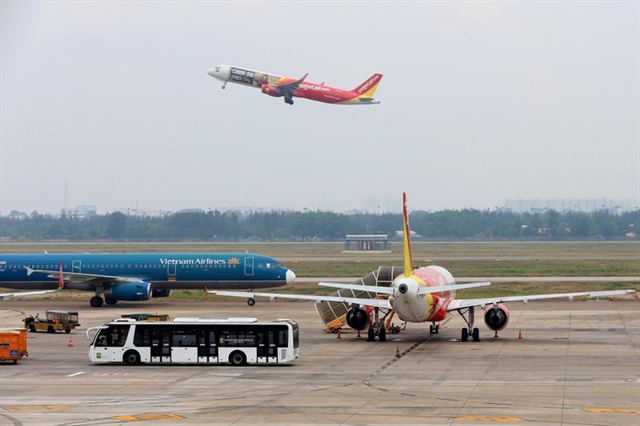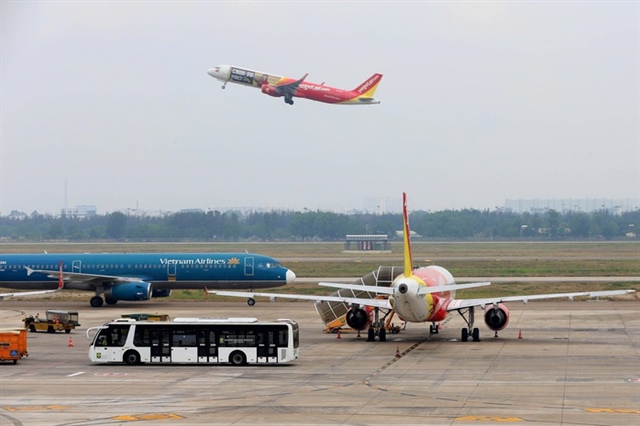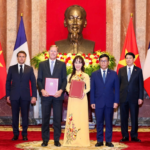During French President Emmanuel Macron’s recent state visit to Vietnam, Vietjet Airlines signed an agreement with Airbus International to purchase 20 wide-body A330-900 aircraft, marking a significant step in its development plans for the next decade.
A New Player, an Expanded Fleet
With this contract, Vietjet has now ordered a total of 40 A330neo aircraft. Additionally, the airline has existing orders for 96 single-aisle A320neo planes. Their current fleet stands at 115 Airbus aircraft, including 108 A320s and 7 A330-300s.
According to Vietjet, the new order will support their expansion plans, including increasing flight frequencies on high-demand routes in the Asia-Pacific region and venturing into long-haul flights to Europe in the future.
In another notable development, the Prime Minister has approved the establishment of a new airline, Sun PhuQuoc Airways (SPA), under the Sun Group. SPA is expected to have a fleet of 31 aircraft by 2030, with a total investment of approximately 98.81 million USD. The airline plans to operate its first flight in the fourth quarter of 2025, connecting Phu Quoc with key economic and tourist destinations.
 The aviation industry is witnessing new developments as airlines rush to place orders for new aircraft. Photo: HOANG TRIEU |
For Sun Group, the approval of the new airline is a significant milestone, not just for the company but also for the development of Phu Quoc’s tourism industry and Vietnam’s aviation sector as a whole. SPA aims to become a new bridge, connecting Phu Quoc with domestic and international travelers.
Meanwhile, Vietnam Airlines has approved a plan to purchase 50 narrow-body aircraft by 2032. The airline will focus on investing in this aircraft type to improve operational efficiency and meet the growing demand for air travel. “The company is also in the process of opening and restoring 15 key international routes to markets such as Italy, Russia, Denmark, China, Japan, and the UAE,” shared a representative from Vietnam Airlines. “These moves will help Vietnam Airlines expand its market share and enhance its international competitiveness.”
Bamboo Airways, which is undergoing restructuring, also plans to add new aircraft to its fleet starting in June to cater to the peak summer travel season in 2025.
Vietravel Airlines has also been making strides since Mr. Do Vinh Quang, Vice Chairman of T&T Group, took over as Chairman at an extraordinary general meeting in April 2025. The airline welcomed T&T Group as a strategic investor in December 2024 after the Vietravel Group transferred its shares.
At this meeting, the major shareholder, T&T Group, unveiled its new direction in the aviation industry, aiming to build a comprehensive aviation ecosystem following a conglomerate model. In addition to passenger transportation, T&T Group also plans to expand into air cargo and the development of a regional aviation logistics center.
Embarking on a New Growth Trajectory
Dr. Bui Doan Ne, Vice President of the Vietnam Aviation Business Association (VABA), cited IATA’s prediction that 2025 will mark a year of recovery for the global aviation industry. The Asia-Pacific region is expected to experience the strongest growth, at approximately 9.1%. Vietnam is projected to be the fifth-fastest growing market, with an estimated 150 million passengers by 2035. “This year, domestic aviation has rebounded, surpassing pre-pandemic levels,” Dr. Ne noted. “The restoration and expansion of international routes enhance competitiveness. Investing in airport infrastructure and expanding fleets are crucial steps to cater to the market’s demands.”
From a passenger’s perspective, the expansion of fleets and the entry of new players like SPA could help ease airfare prices. Currently, six domestic airlines operate regular flights in Vietnam’s domestic market: Vietnam Airlines, Vietjet Air, Bamboo Airways, Pacific Airlines, Vasco, and Vietravel Airlines. Dr. Chu Thanh Tuan, Deputy Head of the Bachelor of Business program at RMIT University Vietnam, offered his insights: “In theory, the entrance of a new player in a monopolistically competitive market like aviation should increase competition, potentially leading to lower prices or improved service quality. However, both domestic and international experiences show that this impact is not always clear or sustainable.”
In Vietnam, several private airlines, such as Indochina Airlines and Air Mekong, have ceased operations due to prolonged losses and challenges in competing with larger carriers. “High operating costs, thin profit margins, and dependence on state-controlled aviation infrastructure, which is already overloaded, contribute to these challenges,” Dr. Tuan explained. “While the presence of private airlines is necessary, sustainable development requires clear strategies and supportive policies, such as tax incentives, slot access, or reduced service fees during the initial stages.”
|
Significant Increase in Summer Flights According to the Vietnam Aviation Authority, during the 2025 summer peak season (from May 15 to August 15), domestic airlines are expected to operate 68,558 flights (an average of 745 flights per day) on domestic routes, representing a respective increase of 21% and 18%. The seat supply will reach approximately 14 million, reflecting a respective increase of 21% and 18% compared to the pre-increased flight schedule and the previous summer season. This summer, air travel demand is anticipated to surge, especially on key routes to popular beach destinations. Domestic airlines are implementing various solutions to enhance their operational capacity during this high-demand period. |
THAI PHUONG
“Bamboo Airways Expands its Fleet: A Billionaire’s Vision with a $7.2 Billion Airbus A330neo Order.”
This long-term order will support Vietjet’s ongoing international expansion plan, enabling the airline to boost frequencies on high-demand routes across the Asia-Pacific region and debut new long-haul services to Europe in the future.
Vietjet Orders 20 Wide-body Aircraft from Airbus
Vietjet has bolstered its wide-body aircraft fleet with a new order for A330neo planes, bringing the total number of these state-of-the-art jets to 40. This significant investment in the A330neo showcases the airline’s commitment to offering passengers a superior flying experience. In addition to these wide-body aircraft, Vietjet also has 96 A320neo narrow-body jets on order, demonstrating their confidence in the Airbus family of aircraft to meet their operational needs.





















